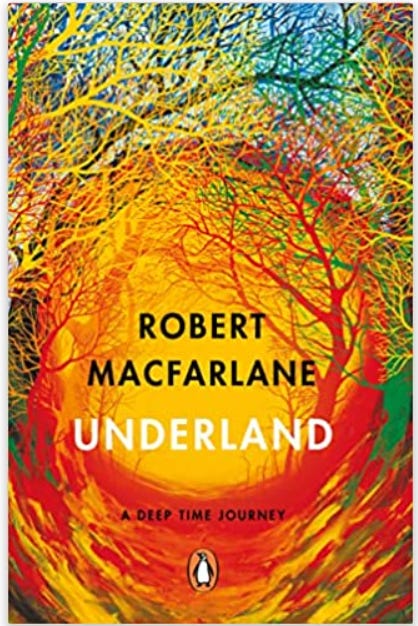Welcome aboard The Bus!
ARCHIVE EDITION - ORIGINALLY PUBLISHED: 14 APRIL 2022
The Stop
One of the Twelve Olympians,1 Demeter - like all members of the Pantheon - held numerous responsibilities2 but is primarily connected with the harvest and its association with the cycle of life and death. In short, as far as the ancients were concerned, a happy Demeter granted a good harvest, while an unhappy Demeter … you get the picture. And this is where the story begins.
There are numerous versions of the myth,3 but the basic gist is this: Demeter had a daughter, Persephone.4 One day, while Persephone was out and about gathering flowers, Hades - in a jet-black chariot pulled by jet-black stallions - burst through a cleft in the earth and abducted her. Dragging the young goddess into the Underworld, Hades planned to make her his bride and queen.5
Demeter searched everywhere for her missing daughter, becoming increasingly frantic and grief-stricken. As a result, she took her eye off of the harvest. Living things stopped growing, crops faded and began to die. The weather changed, growing colder and colder until the land was frozen and covered with snow. The land stopped producing, and the people began to starve.
Fearing for their lives, the people appealed to Zeus to intervene. Reluctantly he did, sending Hermes to bring her back. Hades was willing to release the girl, but while a captive Persephone had eaten six pomegranate seeds,6 binding her to Hades for an equivalent number of months each year. Confronted by this legality, Demeter agreed her daughter would divide her time: six months on Olympus with the other gods and goddesses followed by six months with Hades for the other half of the year. Consequently, for the six months Demeter is happily with her daughter the weather is good and crops flourish. But when the time comes for Persephone to leave her mother and descend to the Underworld, the weather changes and things begin to wither and die.
Despite what might appear an obvious connection of Demeter to an explanation for the seasons, this is peripheral to her relation with the Eleusinian Mysteries.7 One of the most important of the ancient mystery religions,8 its rituals were jealously guarded and hidden from the uninitiated on pain of death. To reveal any part was to break divine law, though despite such injunctions over time the natures of these rituals have been (mostly) discovered.
The Eleusinian Mysteries will be a further Stop, but their importance cannot be overstated in the context of the upcoming Easter holiday. At one point, almost all of the prominent intellectuals of the time were participants in the rites - including the ingestion of the kykeon, a drink with the effect of creating an experience through which many found ‘evidence’ of the soul’s existence.9 These intellectuals would have spread these ideas far and wide and their insights and beliefs - (1) the cyclical notion of birth, death and rebirth, (2) the existence of a soul separate to the body and (3) the concept of someone returning from the land of the dead - became widespread.
It’s important to note Persephone’s return from the underworld is not the same as resurrection as there is no indication that - despite her six-month residency - she was ever dead. But what is important is how the ideas of rebirth and regeneration begin to become legitimised in the ancient world, setting the stage for acceptance of such a profoundly paradoxical idea as resurrection from the dead.
Predating Christianity by at least 650 years, Demeter’s story shows that nothing - not even the most sacred beliefs - emerge in a vacuum. Everything is connected.
The Detour
Today’s Detour is to this article on the effect of poisonous mushrooms on the body: What Happens in Your Body if You Eat Poisonous Mushrooms
I’m a big fan of mushrooms and while it’s crossed my mind to take a course on identifying them in the wild, it’s articles like this which make me think it’s better to just pick them up in a local grocery store.
It also doesn’t hurt to reiterate the conclusion of this article: be very, very sure of the mushrooms you eat.
The Recommendation
Keeping with the subterranean theme, today’s book is Robert MacFarlane’s Underland. Subtitled ‘A Deep Time Journey’, this book by the author of (among others) Mountains of the Mind: A History of a Fascination, The Wild Places and The Old Ways is an immersion into the amazing world below our feet. Whether it’s the interconnectivity of fungi in Epping Forest, the Parisian catacombs or the problem of preventing people in the distant future from digging up our nuclear waste, this book will change what you think about your place in the world. Human impact underground is as - and sometimes more - important than what we do above ground, and as the Earth will last long after humans have gone, we must ensure what we do now does not negatively affect whoever - or whatever - our descendants may be.10
The Sounds
Today’s playlist is composed of five songs that have recently stuck out from many others: ‘Zanzibar’ (Billy Joel, 1978), ‘She’s My Collar’ (Gorillaz, 2017), ‘Homage’ (Mild High Club, 2016), ‘Maple Syrup’ (The Backseat Lovers, 2019) and ‘Tranquility Base Hotel & Casino’ (Arctic Monkeys, 2018). Enjoy!
The Thought
Today’s Thought is from Rhian Toates, one of my yoga teachers.11 The class was working on grounding our feet to the floor when she asked:
‘Why don’t we spend more time training our brain to focus on our toes?’
And that’s the end of this stop - I hope you enjoyed the diversion from your regular journey.
Thanks to everyone who subscribes - I genuinely appreciate your interest and support. If you like The Bus, please SHARE it with a friend or several hundred.
If you haven’t climbed aboard, please do!
Until the next stop …
In the Olympic Pantheon’s Who’s Who, it’s generally accepted the Twelve Olympians are Zeus, Hera, Poseidon, Demeter, Athena, Apollo, Artemis, Ares, Hephaestus, Aphrodite, Hermes and Dionysus. See: 12 Olympians (Worldhistory.org).
Some of these responsibilities include fertility, the sacred law, agriculture and the cycle of life and death. Demeter’s a fascinating goddess, connected with numerous myths and traditions. For a quick outline, see: Demeter (Britannica).
For an ancient contemporary account of the myth, see the ‘Homeric Hymn to Demeter,’ from Harvard University’s Center for Hellenic Studies: Homeric Hymn to Demeter (Harvard).
Persephone is the daughter of Zeus and Demeter - who are siblings. Hades is her uncle. If you think these relationships are odd, try picking apart Genesis.
There’s no indication Hades ever mentioned this desire to Persephone before taking the matter into his own hands, though I imagine she’d have been about as keen to marry her uncle as she would have been to live with the dead all her life.
Though pomegranate seeds are lovely, removing them from the fruit is inversely proportional to any pleasure they impart. However, that’s irrelevant - the importance of the pomegranate is not the pomegranate, but the idea that Persephone had tasted the food of the underworld.
According to the myth, while searching for her daughter Demeter visited Eleusis - about 30 minutes outside of modern Athens. She disguised herself as an old woman and was befriended by the royal family. One thing led to another, and eventually Demeter revealed her true identity and commanded a temple be built in her name. This is the beginning of what becomes known as the Eleusinian Mysteries. And Eleusis - not unlike Delphi, Lourdes, Fatima or Mecca - certainly benefitted financially.
Mystery religions are so-called because the beliefs, rituals and practices would have been kept secret - a mystery - from the uninitiated. Other famous mystery religions (and future Bus Stops) include those of Orpheus, Dionysius and Isis.
There is evidence that Plato (and Socrates before him) were both initiates to the Eleusinian Mysteries. This is extremely important for those who care, as Plato’s idea of the soul becomes an essential component of later religious thought. And if it originated via an hallucinogenic beverage … so much the better. For more detail, see: Eleusinian Mysteries/Demeter (Worldhistory.org).
Yoga is brilliant. Enough said.





